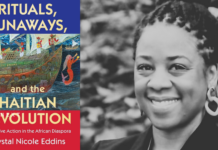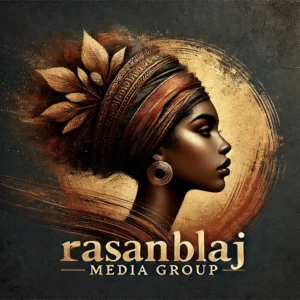This episode explores the life and legacy of Haiti’s founding father, Jean-Jacques Dessalines, through the lens of historian Dr. Julia Gaffield. Drawing from untapped archives and sharp historical analysis, Dr. Gaffield reframes Dessalines not just as a revolutionary general, but as a visionary leader who saw independence as more than a break from France—it was a rejection of white supremacy and a bold assertion of Black sovereignty on the world stage.
Key Topics Covered:
- Dessalines’ transformation from enslaved man to emperor
- The symbolic and literal meanings of vengeance in the Haitian Declaration of Independence
- The complexities of statecraft, nation-building, and internal rivalries post-independence
- Why Dessalines was assassinated—and why his legacy remains contested
- Gaffield’s process of researching archives in France, Haiti, and the U.S.
Notable Quotes:
“The world wasn’t ready for what Dessalines imagined. And perhaps it still isn’t.”
“To avenge is not to destroy. It’s to restore the balance of dignity.”
Why it matters:
Dessalines is often caricatured or sanitized in historical memory. This episode challenges that flattening by offering listeners the tools to understand him as a radical leader—shaped by slavery, motivated by justice, and ultimately sacrificed by a system unprepared for his vision.
I. Overview and Research Background
Dr. Julia Gaffield discusses her extensive research and writing process for her new biography of Jean-Jacques Dessalines. The book, a culmination of almost two decades of interest in Dessalines and the Haitian Revolution’s aftermath, began in earnest in late 2019 and concluded with a contract signed in March/April 2020. Gaffield highlights the significant gap in English-language biographies of Dessalines, asserting her book may be the first in 50 years or ever, noting a historical “distinct disinterest in reading and writing about Dessalines in the anglophone world.”
She challenges the notion of limited source material, stating, “Lack of source material has never really stopped historians. We have creative and innovative ways of studying topics and people, even people who left very limited source material. But I also think that, Dessalines left a whole lot of source material as I clearly believe enough to write a biography.” Instead, she attributes this disinterest to a “two century plus trend of very racist trend of undermining him as a person simplifying portrayals of him, he’s always been… a one dimensional character in histories of the revolution.” This bias also affected the publishing industry’s perception of readership for such a story.
II. Key Discoveries and Personal Connections
A significant personal and academic milestone for Dr. Gaffield was her identification of the only known remaining official copy of the Haitian Declaration of Independence (a printed document, not a signed manuscript) in the British Archives in 2010. This discovery, made shortly after the 2010 earthquake in Haiti, garnered significant media attention. Gaffield meticulously traced the document’s journey from Haiti to the Governor of Jamaica and then to London, where it was cataloged in the Jamaican Colonial records (CO 137 collection). She notes the initial academic reception was subdued, but public interest quickly grew, highlighting a “real desire to learn more about the Haitian Revolution.”
III. Challenging Dominant Narratives and Terminology
Gaffield actively challenges several widely accepted historical narratives and terms related to Dessalines and Haitian history:
- “Tainos”: She “refuse[s]” to use the term “Tainos” for the indigenous people of Haiti, explaining that “it’s a term that scholars have emphasized that was imposed on the indigenous people of Haiti, and that it was not a term of their own making.”
- Dessalines’ Illiteracy: Gaffield argues against the popular descriptor of Dessalines as “illiterate.” While acknowledging he learned to sign his name, she states, “I don’t think he’s having other people write things and signing it, not knowing what’s happening and not contributing to the composition of those documents.” She views this as a “descriptor that was wielded against him during his lifetime as a way to discredit him to undermine his authority, to undermine his intelligence, to undermine his diplomacy.”
- Dessalines’ African Birth: She also “argue[s], no” regarding Dessalines being born in Africa, seeing it as another “descriptor that was used to undermine and discredit him and to characterize him as somebody who is barbaric. Or savage.” Most evidence points to his birth in the north of Saint-Domingue (Haiti), likely around 1758, though precise birth records are lacking.
IV. Dessalines’ Early Life and Kinship Networks
The interview delves into Dessalines’ early life, including the origin of his last name. He was initially enslaved by a “poor white man” named Declos, described as “a very cruel person.” Later, he was sold to Phillipe Jasmin, a free Black man, on the Jasmin plantation. It was after Jasmin’s death and his wife’s remarriage to Jean Dessalines that heacquired the last name he kept.
Gaffield highlights the significance of Dessalines’ kinship networks. While his parents are unknown, he maintained deep, lifelong relationships, notably with a woman named Victoria Toya, whom he worked alongside in the fields as a child and whose death devastated him in 1805. On the Jazzma plantation, he was reunited with an extended family, including an uncle (Itan), aunts, and cousins, which “likely increased” his quality of life. The fact that he was listed as “Jean-Jacques nephew” in a rare colonial document emphasizes the importance of these family ties.
Crucially, Gaffield reveals that Toussaint Louverture himself leased the Jazzma plantation and “runs the plantation where Deline is enslaved” for about two and a half years, creating a “hierarchical relationship.” This period marks the beginning of their complicated but often respectful relationship, with Dessalines showing “deep respect for Louve” throughout the revolution.
V. Dessalines: Warrior, Diplomat, and Anti-Colonial Leader
Gaffield describes Dessalines as embodying “the personal and collective” in his fight for freedom. His personal experiences of enslavement deeply shaped his broader anti-colonial struggle. She also explores the nuanced definitions of freedom among different groups:
- Creole-born (like Dessalines): “inherited a version of freedom from the colonizers that prioritize the idea of productive citizenship.” This led Dessalines, having only known the plantation world, to initially try and “sustain the plantation economy as a way to protect the country and independence,” a move for which he was widely criticized.
- African-born (Bossale): “prioritized family relations, collective property and relations of reciprocity.” This distinction contributed to “conflict ridden relationships during the independence period.”
Dessalines’ alleged “Africanized” traits are seen more as a “version of Creole-ness that is much more oppositional antagonistic to France and French colonialism,” emphasizing Creole language and a “much firmer rejection of France.”
His allegiance to the French Republic in the 1790s is presented as highly “strategic,” a means to “advanc[e] his cause” rather than a genuine affiliation. The crucial shift in his allegiance came with the news of the reinstatement of slavery by the French, which “would have tip the balance regardless.” Dr. Gaffield suggests that French general Rochambeau’s antagonistic behavior towards Dessalines also played a catalytic role, as many colonial generals “really hated Rochambeau.”
Despite his image as a fierce warrior, Gaffield argues Dessalines was also a skilled diplomat. Her first book, “Haitian Connections,” focused on this aspect. She states, “I think he was both the warrior leader and a diplomat.” His diplomacy often intertwined with military concerns, as he led a nation constantly at war. An example is his negotiations with Jamaica in 1803-1804, where he “asserts Haitian sovereignty” against British attempts to integrate Haiti into their empire, ultimately securing a de facto sovereignty even without formal recognition.
VI. The “Media War” and External/Internal Threats
Dessalines, as Emperor of Haiti (crowned 1804), faced immense “internal and external threats.” A significant external threat was the relentless “propaganda campaign against him” waged by France, which simultaneously attacked Haiti’s sovereignty. Louis duBroca’s “alleged biography” of Dessalines is highlighted as “mostly fiction,” a fabricated work designed to criticize the British (for assisting Haitian revolutionaries) and “undermine Haitian sovereignty.”
Gaffield stresses the enduring impact of this propaganda, citing the infamous woodcut image of Dessalines holding a decapitated white woman’s head, which “gets used in, things like news clips like on Tucker Carlson” even today. This rhetorical war was part of a “violent and extensive campaign by the French to undermine Haitian independence.”
VII. Key Documents and Constitutional Policies
The interview focuses on two critical declarations of independence:
- November 29, 1803 Proclamation: Issued collective after the French evacuation (which was an evacuation, not a concession of defeat or peace treaty). It articulated a vision of peace and continued to protect white property, reflecting an assumption that the war was over.
- January 1, 1804 Act: This declaration, which Gaffield found the original copy of, reflects a shift in tone. Over December 1803, French actions (proclamations, attacks on shipping, threats of reinvasion) made it clear the war was not over. The January 1st document therefore adopted a tone of “eternal hatred to France” and served as “a call to arms” in response to ongoing French threats to re-colonize Haiti and reintroduce slavery.
Dessalines’ 1805 Imperial Constitution is also discussed, particularly Articles 12 and 14, which stipulated that white people (specifically white men) could not own land in Haiti. However, Gaffield emphasizes that there were “many exceptions to this rule,” including white women, Germans, Poles, and others who proved their loyalty and were naturalized. This policy, though appearing harsh, was part of a “broader anti-colonial policy” to prevent former enslavers from restricting the rights of Black people.
VIII. The Santo Domingo Campaign and Haitian Flag
Dessalines’ failed campaign to assert control over the eastern side of Hispaniola (Santo Domingo) in February-March 1805 is reviewed. The Haitian State claimed the entire island, but French forces under Jean-Louis Ferrand remained a threat from Santo Domingo, proclaiming French reinforcements were coming. Dessalines’ attack failed when a French fleet arrived in the harbor, which was interpreted as the anticipated reinforcements.
Regarding the Haitian flag, Gaffield acknowledges the popular folklore of Dessalines tearing the white strip from the French flag. While she notes, “he, it might have happened,” she cautions that “there isn’t solid archival evidence to, to say that it did happen.” She suggests that while symbolism is important, historians cannot definitively confirm the exact creation story, though “there’s evidence that shows that it was a red and black or a red and blue flag initially.”
IX. Final Takeaways on Dessalines
Dr. Gaffield’s primary takeaway from her extensive research is that Dessalines was an “incredibly complicated person who lived in a very complicated world.” She stresses that simplistic descriptions and narratives fail to capture “the fullness of his of his experiences what he lived through and his kind of broader contributions to the age of revolutions, but like to modern history.” His life and legacy defy one-dimensional portrayals.
This study guide is designed to help you review and deepen your understanding of the interview with Dr. Julia Gaffield, focusing on her book “I Have Avenged America,” Jean-Jacques Dessalines, and the Haitian Revolution.
Quiz: Short Answer Questions
Answer each question in 2-3 sentences.
- Dr. Gaffield’s Motivation for “I Have Avenged America”: Why did Dr. Gaffield choose to write a biography about Jean-Jacques Dessalines, especially given the existing scholarship on the Haitian Revolution?
- The “Isolation Thesis”: What is the “isolation thesis” regarding Haiti’s post-independence period, and how does Dr. Gaffield’s research challenge this simple narrative?
- Discovery of the Haitian Declaration of Independence: What significant archival discovery did Dr. Gaffield make in 2010, and why does she prefer the term “identified” over “discovered”?
- Challenging the “Illiterate” Descriptor: Why does Dr. Gaffield hesitate to describe Dessalines as “illiterate,” and what does she suggest about his involvement in composing documents?
- Dessalines’ Birthplace and Characterization: What is Dr. Gaffield’s argument regarding Dessalines’ birthplace, and how does she connect prevailing descriptions of him to racist trends?
- Enslaved People’s Naming Conventions: Describe the various ways enslaved people in the colony acquired names, as discussed by Dr. Gaffield, and provide an example related to Dessalines.
- “Bad Slave” Description: Explain what the term “bad slave” meant in the context of Dessalines’ early life and how it characterized his behavior under slavery.
- The Two Declarations of Independence (1803 vs. 1804): What key difference in context and tone distinguished the November 1803 proclamation from the January 1804 Act of Independence?
- Dessalines as Warrior and Diplomat: How does Dr. Gaffield characterize Dessalines’ leadership, particularly in terms of his roles as a warrior and diplomat, and what challenges did he face in these roles?
- Article 12 and 14 of the Constitution: Explain the general policy outlined in Articles 12 and 14 of the Imperial Constitution regarding white land ownership, and note the exceptions mentioned.
Answer Key
- Dr. Gaffield’s Motivation for “I Have Avenged America”: Dr. Gaffield was drawn to Dessalines because she felt existing narratives of the Haitian Revolution often ended with independence, overlooking the complex post-revolutionary period and his ongoing fight. She also saw a need for an English biography of Dessalines, believing his story was overlooked in favor of Toussaint Louverture.
- The “Isolation Thesis”: The “isolation thesis” posits that after declaring independence, Haiti was simply isolated by the international community for decades. Dr. Gaffield argues this is an oversimplification, as Dessalines continued both military and diplomatic struggles, indicating a more complex reality than outright isolation.
- Discovery of the Haitian Declaration of Independence: Dr. Gaffield identified the only known remaining official copy of the Haitian Declaration of Independence, a printed document, in the Jamaican Colonial records in London. She uses “identified” to acknowledge the work of archivists and avoid the implication of being the first to simply “find” it.
- Challenging the “Illiterate” Descriptor: Dr. Gaffield challenges the descriptor “illiterate” because it was historically used to discredit Dessalines and undermine his authority. She believes he learned to sign his name and participated in composing his letters, suggesting he was not merely signing documents without understanding their content.
- Dessalines’ Birthplace and Characterization: Dr. Gaffield argues Dessalines was born in the north of Saint-Domingue (modern Haiti), not Africa, and that claiming he was African-born was a racist tactic to portray him as barbaric. Most evidence points to his birth in the colony, specifically in Cormiers.
- Enslaved People’s Naming Conventions: Enslaved people born in the colony were assigned names by their enslavers, possibly with some family input. Captives from the transatlantic slave trade were also assigned names but might have maintained previous names in private circles. Many enslaved people also adopted the last names of their enslavers, with Dessalines reportedly still being known as “Dulo” by some who knew him in childhood.
- “Bad Slave” Description: Dessalines was described as a “bad slave” by a French consul because he was insubordinate, unwilling to submit, and did not consistently follow orders. This characterization highlighted his resistance to enslavement and his defiance of authority, leading to severe punishments.
- The Two Declarations of Independence (1803 vs. 1804): The November 1803 proclamation was issued under the assumption that the French evacuation signaled peace and an amicable future relationship with France. In contrast, the January 1804 Act reflected the realization that France had not conceded defeat and intended to re-invade, leading to a tone of “eternal hatred to France” and a call to eternal war.
- Dessalines as Warrior and Diplomat: Dr. Gaffield views Dessalines as both a warrior leader and a diplomat, whose military and diplomatic concerns were deeply intertwined because he always led a country at war. While he was praised for his military prowess, his diplomacy, though different, was critical in asserting Haitian sovereignty and resisting integration into foreign empires.
- Article 12 and 14 of the Constitution: These articles established an anti-colonial policy that generally prohibited white people from owning land in Haiti, due to their past actions in restricting black people’s rights. However, exceptions were made for white individuals who had proven their loyalty or usefulness, such as white women, Germans, Poles, and others granted naturalization certificates.
Essay Format Questions
- Analyze how Dr. Gaffield’s biography of Jean-Jacques Dessalines challenges prevailing historical narratives about the Haitian Revolution and its aftermath, particularly concerning the “isolation thesis” and Dessalines’ character.
- Discuss the significance of Dr. Gaffield’s identification of the official Haitian Declaration of Independence. How did this discovery impact her personal academic journey, and what broader desire to learn about the Haitian Revolution did it reveal?
- Examine the various ways in which Jean-Jacques Dessalines was deliberately undermined and discredited during his lifetime and in subsequent historical accounts. How does Dr. Gaffield address and refute these portrayals, particularly regarding his literacy and birthplace?
- Compare and contrast the November 1803 proclamation and the January 1804 Act of Independence. What do these two documents reveal about the evolving understanding of Haitian independence and its relationship with France, and Dessalines’ leadership?
- Based on the interview, evaluate Dessalines’ leadership qualities as both a warrior and a diplomat. Provide specific examples from his life and the revolution that illustrate how these roles intertwined and the challenges he faced in navigating them.
Glossary of Key Terms
- “I Have Avenged America”: The title of Dr. Julia Gaffield’s biography on Jean-Jacques Dessalines, signifying his role in achieving and defending Haitian independence.
- Jean-Jacques Dessalines: A key leader of the Haitian Revolution, Toussaint Louverture’s lieutenant, and the first emperor of independent Haiti. Dr. Gaffield’s book focuses on his life and contributions.
- Haitian Revolution: A successful anti-slavery and anti-colonial insurrection by self-liberated slaves against French rule in Saint-Domingue, leading to the establishment of the independent nation of Haiti in 1804.
- Isolation Thesis: A historical narrative suggesting that newly independent Haiti was completely cut off and isolated by the international community for decades after 1804. Dr. Gaffield’s research implies this narrative is overly simplistic.
- Declaration of Independence (Haiti, January 1, 1804): The official document declaring Haiti’s independence from France, composed of three elements: the oath itself, a speech, and Dessalines’ nomination. It replaced an earlier, more conciliatory proclamation.
- November 29, 1803 Proclamation: An earlier declaration of independence issued after the French evacuation, which had a more optimistic tone, assuming peace and a potential future relationship with France.
- Official Copy of the Haitian Declaration of Independence: The printed, government-issued version of the Haitian Declaration of Independence, identified by Dr. Gaffield in the Jamaican Colonial records, distinct from a signed manuscript.
- Anglophone World: Refers to the English-speaking world; Dr. Gaffield notes a “distinct disinterest in reading and writing about Dessalines” in this context prior to her work.
- Louis Dubroca: The alleged author of a biography on Dessalines, which Dr. Gaffield describes as largely fictional and used as French propaganda to undermine Haiti.
- Rochambeau: Donatien-Marie-Joseph de Vimeur, vicomte de Rochambeau, a French general who led French forces during the final phase of the Haitian Revolution and was intensely disliked by Dessalines and other Haitian generals.
- Clerc Expedition: The French military expedition sent by Napoleon Bonaparte in 1802, led by Charles Leclerc, with the aim of restoring French authority and slavery in Saint-Domingue.
- “Bad Slave” (Mo): A term used to describe Dessalines during his enslavement, indicating his insubordinate nature and resistance to authority.
- Gilo: The first documented enslaver of Jean-Jacques Dessalines, described as a cruel coffee plantation owner.
- Felipe Smay (Felix Ime): A free black man who later enslaved Dessalines. Dessalines’ quality of life likely improved on Smay’s plantation, where he was reunited with an extended family network.
- Victoria Toya (Toya): A woman with whom Dessalines shared a very close relationship during his enslavement, described as a kinship tie that profoundly impacted him.
- Itan: Dessalines’ uncle, with whom he was enslaved on the Smay plantation.
- Jean Deline: The man whom Smay’s wife remarried after Smay’s death; Jean-Jacques Dessalines acquired his last name from him. Jean Deline was also a colonial militiaman, possibly influencing Dessalines’ military skills.
- Creoles: In this context, individuals born in the colony of Saint-Domingue, often contrasted with African-born enslaved people regarding their definitions of freedom and views on the plantation economy.
- Bossales: African-born enslaved people, whose definition of freedom often prioritized family relations, collective property, and reciprocity, contrasting with some Creole perspectives.
- Santo Domingo Campaign (1805): Dessalines’ failed military campaign to assert Haitian dominion over the entire island, specifically attacking the city of Santo Domingo in the East, which was still under French control.
- Imperial Constitution (1805): The constitution issued by Dessalines as Emperor of Haiti. Articles 12 and 14 are notable for their policies on white land ownership.
- French Republican Calendar: The dating system adopted during the French Revolution, which Haiti initially used but then abandoned for the Gregorian calendar, adding a new year of independence.
convert_to_textConvert to source



